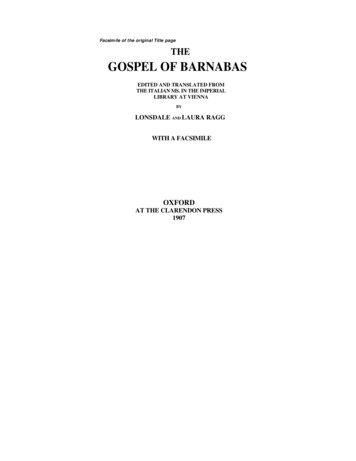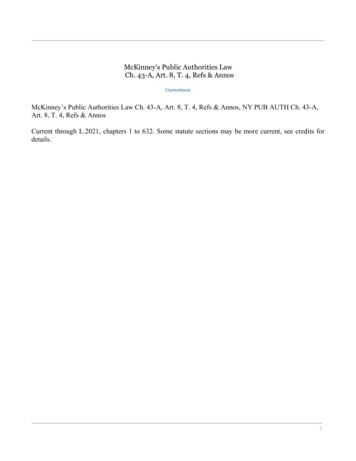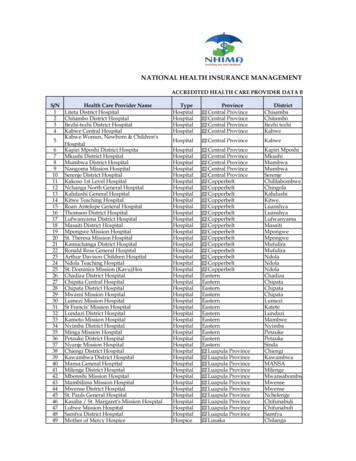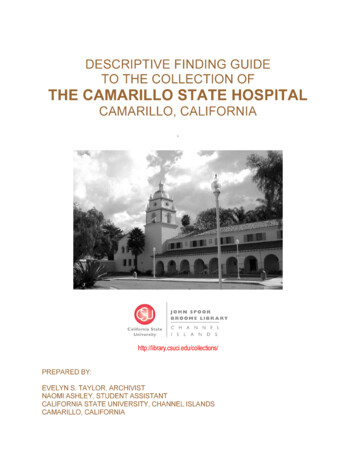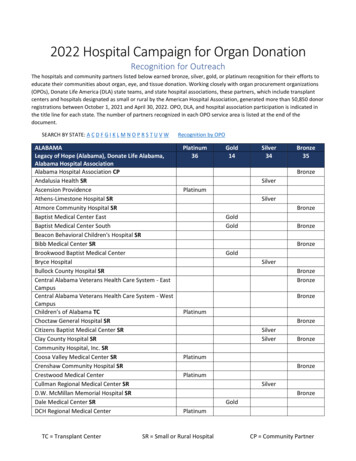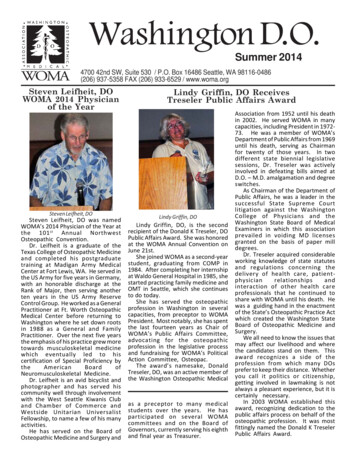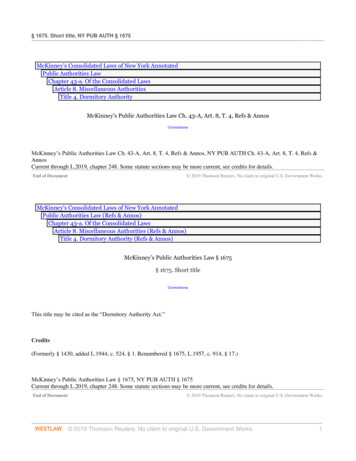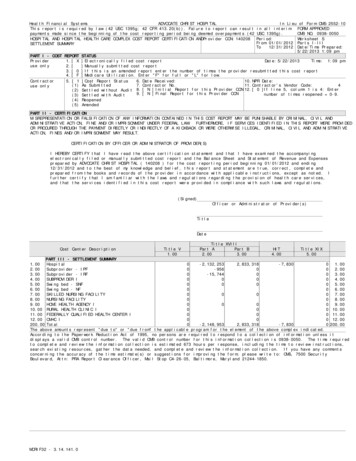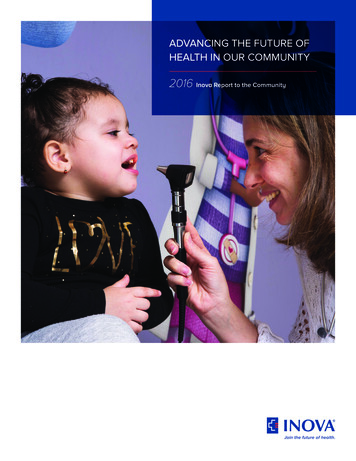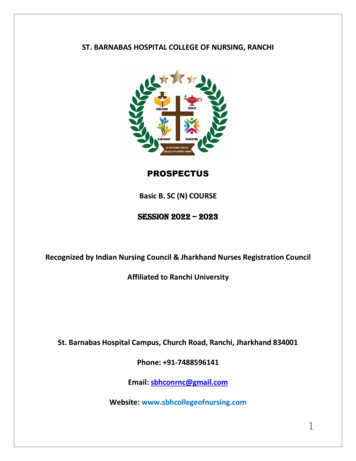
Transcription
ST. BARNABAS HOSPITAL COLLEGE OF NURSING, RANCHIPROSPECTUSBasic B. SC (N) COURSESession 2022 – 2023Recognized by Indian Nursing Council & Jharkhand Nurses Registration CouncilAffiliated to Ranchi UniversitySt. Barnabas Hospital Campus, Church Road, Ranchi, Jharkhand 834001Phone: 91-7488596141Email: sbhconrnc@gmail.comWebsite: www.sbhcollegeofnursing.com1
AT A GLANCEAdmission Calendar 2022S No.12.34.5678.9.10.ParticularsOnline Applications starts. Refer websitewww.sbhcollegeofnursing.comOnline Applications closesDate of Entrance examinationDisplay of list of selected candidates forcounseling in college notice boardInterview & CounsellingDisplay of FINAL LIST of selected candidates &WAIT LISTED candidatesDate of Registration, Admissions & submission offees to the course by Final list candidatesDate of Registration, Admissions submission offees to the course by Wait listed candidatesOrientation classes startsCommencement of classesDateMarch 15, 2022July 15, 2022July 19, 2022July 22, 2022July 27 & 28, 2022July 27, 2022August 1 – 4, 2022August 5 – 6, 2022To be announced laterTo be announced laterIMPORTANT POINTS1. Admission shall be strictly on the basis of merit assessed through Entrance test and theSBH College of nursing policy. Approval of the competent authority will be final &complied and other eligibility criteria specified in the prospectus. Limited number ofstudents will be called for counseling.2. After filling all seats only those remaining candidates who attended the counseling will bewaitlisted for further rounds of counseling if any seat falls vacant.3. Admission shall be confirmed only after verification of original certificates issued by theconcerned Examination Board & Ranchi University and Medical fitness by St BarnabasHospital, Ranchi.4. False/Fake/Incomplete information submitted for admission will be rejected out rightly.5. Candidates must visit the college website regularly for all important updates.6. Date of admission should be strictly followed failing which next candidates will be calledfor admission.2
WELCOME FROM PRINCIPALWelcome to St. Barnabas Hospital College of Nursing, Ranchi. We are pleased thatyou have chosen our College of Nursing for your nursing study. The College visionis to prepare professional nurses, leaders and educators for the society throughexcellent and innovative education based on Christian principles. As student youare part of our vision and we are committed to ensuring your success not only asstudent but as future health professionals.A Bachelor of Science degree in Nursing (B. Sc. N) provides the graduate licensureas a registered nurse and midwife as well as a foundation for advanced nursingpractice.Though nursing is challenging, it is also very rewarding. You will have opportunitiesto make a difference in the lives of others through caring for the sick and injured,providing comfort to the dying, and performing health teaching to a variety ofclients.I hope you will have an exceptional learning experience in the College. Our facultywill ensure you have meaningful classroom and clinical experiences. They willsupport you in achieving your goal.I am confident that you will develop your practice, leadership skills, knowledge andskills as you learn side by side with the nursing service staffs that provides care atthe St. Barnabas Hospital and community-based clinical sites.If you have any questions, we are more than willing to answer your questions andprovide you with assistance or advice.Again, I welcome you to the College of Nursing and to the profession and wish youa rewarding learning experienceMamta Soren, B. Sc (Hons) N, M. Sc. N, Principal3
MESSAGE FROM CHAIRMANDear Aspirants,As the Chairman of the Chotanagpur Diocesan Educational Society, it is my pleasureto welcome you to this place of learning.Nurses’ roles in this modern era have changed. They are not only expected toprovide care to sick but also to well and needy people in various health caresettings.Education of Nurses contributes a lot to promote and maintain the health of thenation as a whole. Today nursing is therefore not only a job but it plays animportant role in making healthy society.The college prepares students for a successful career in nursing through theintegration of academic excellence, Christian faith, and professional competence.Students develop personally, spiritually, and professionally during their time withthe College of Nursing.I advise prospective students to follow the example established by Jesus Christ andcare for others in the same manner as our saviour. Nursing provides a wonderfulopportunity for ministry.Ask Lord’s guidance and prayerfully wait for His direction as you enter thiswonderful profession.May God bless youRt. Rev. B. B. Baskey Chairman,Chotanagpur Diocesan Educational Society,4
I. ABOUT US (History/Motto/Mission/Vision/Core Values/Philosophy)1. Name of the college:St. Barnabas Hospital College of Nursing2. HistoryAnglican Missionaries started St. Barnabas Hospital in the year 1885. Initially it functioned as asmall dispensary. It was the untiring efforts of pioneers that the small dispensary emerged into afull-scale hospital. Today it is a 150 beds General hospital that caters to all section of societywithout considering their religion, cast and creed.As the time went on need was felt to prepare skilled nurses for bed side care. With this felt needin mind the School of Nursing (GNM) was started in 1982 under the leadership of Dr. ArnoldEates, the then Medical Superintendent. The school is affiliated to Mid India Board of Educationof Christian Medical Association of India. For over a three decades School of Nursing preparedprofessional nurses who have gone on to provide health care services at State, National andInternational level.Today’s demand is nurses with university degree. These nurses provide leadership in varioushealth care settings and also provide quality care to individuals in need of health care. In orderto respond to these demands and needs and to be able to prepare nurses for national health caredelivery program; it was resolved in 2012 to start Basic B. Sc nursing course at St. BarnabasHospital. The Indian Nursing Council granted permission to start Basic B. Sc nursing with 40 seatsin July 2015. Jharkhand Nursing Council also recognizes our college of nursing. College is affiliatedto Ranchi University.3. Vision StatementSt. Barnabas Hospital College of Nursing envisions itself as an institution for developing clinicallyprepared, scientifically oriented & technologically competent professional nurses, leaders andeducators through excellent and innovative education based on Christian principles and the corevalues of nursing.4. Mission StatementThe mission of the St. Barnabas Hospital College of nursing is to promote excellence & innovativeeducation based upon Christian principles and core values of nursing for preparing professionalnurses, nurse leaders & nurse educators who will engage themselves in lifelong learning in orderto make a positive difference in the health of individuals and community.5
5. Motto“Education, Service, Leadership & Innovation”6. Philosophy“As we have therefore opportunity, let us do good unto all men.” Galatians 6:10The philosophy of the nursing program is consistent with the vision, mission & goals of St.Barnabas Hospital College of Nursing, Ranchi. The members of the society and faculty believethat:Health is a positive and dynamic state of being ranging on a continuum from highest levelwellness to death. It is an instrument that may further capacities while poor health may diminishone's potential. Health is multi-factorial and is influenced by many factors such as individuals’perceptions, culture, values, beliefs, previous experiences, behaviors, environments, genetics,and resources. Health activities include those directed at maintenance, enhancement,prevention and promotion. Health is the central focus of nursing. A broad knowledge of healthgives the nurse flexibility when assisting others with health issues and concerns.Health is right of every individual. All people have the right to acquire, understand, and utilizeinformation needed to assist them in making decisions regarding their personal health. Theperson has the right to quality nursing care that is congruent with his beliefs and needs.Community has a responsibility towards maintaining its people’s health.Person is a unique, holistic, diverse, and valuable creation of God and is worthy of respect fromself and others. The person possesses physiological, psychological, sociocultural, developmental,and spiritual needs which are met in varying degrees through interactions with God, people, andthe environment. Each person develops a personal system of values which give meaning andpurpose to life. People develop behavioral patterns to meet their needs and wants. Thesebehavioral patterns may enhance or diminish health.Environment is a dynamic, comprehensive, complex, and unique context within whichindividuals, families, groups, communities, and society exists. Humans and the environment areinterdependent and interactive. Internal and external environments are constantly changingaffecting the human condition. Nurses empower clients to either adapt to or change theirenvironment. Nurses in partnership with others in society create healthful environment for all.Nursing: Focus of nursing is the people, their environment and their health. Nursing involvescaring that is concerned with improving quality of life and promoting, maintaining and restoringhealth in partnership with individuals, families and communities. Caring encompasses6
characteristics of empathy, compassion, sensitivity, and the ability to connect with patients andfull attention to their needs, interest and values. Caring embodies respect for others includingprofessional colleagues.The practice of nursing requires caring behaviors, flexibility, creativity, effective communication,critical thinking, legal/ethical accountability, dedication, lifelong learning, client advocacy,research & leadership skills and competence in therapeutic interventions. Nurses meet theholistic needs of the individuals, make clinical decisions, solve problems and provide qualitynursing care through utilization of the nursing process in a variety of settings. Evidence-basedPractice (EBP) significantly influences clinical decision making to promote the health of theclients.Within the legal and ethical parameters of the profession the nurses assume the roles ofcaregiver, advocate, communicator, critical thinker, researcher, leader, manager, and teacher toprovide health care to people.As a profession, nursing is legally and ethically accountable to the society for integrity andoutcomes of its practice. Nurses recognize national health goals and are committed to participatein the implementations of health policies and programs.Rapid advances in both science and technology, makes it necessary for nurses to be well informedabout the latest trends.Leadership is an essential quality of professional nursing. Nurses serve as formal and informalleaders in the workplace and the community as patients’ advocates, change agents, conflictmediators, managers and administrators. Leadership can be taught and is developed throughclassroom and clinical activities, role modelling and mentoring others, and involvement inprofessional activities and organizations.Teaching - Learning: is an interactive process between faculty and students. Learning isindividualistic and proceeds in a simple to complex manner from the level of development,interest and motivations of the learner. Student is an active and self-directed participant forlearning process and personal growth.Faculty serves as facilitator, role model, mentor and resource in learning process and help tocreate an environment where learning may take place, using innovative, individualizedapproaches to teachings. The faculty strives to promote professional development, spirit ofenquiry, lifelong learning and professional excellence in students.Teaching – learning empowers both students and faculty through curriculum and opportunitiesfor learning.7
Nursing Education: Nursing education is a collaborative, developmental learning process that isbased on nursing science, behavioural sciences, natural sciences, the humanities and the arts.The goal of nursing education is to produce knowledgeable, competent and self-directedprofessional nurses who will promote the optimal health of individuals, families, groups andcommunities and will focus on continued professional development.Baccalaureate nursing education prepares the graduate for the practice of professional nursingas a generalist who is able to function independently and interdependently with individuals,families and groups in a variety of health care settings.Christian values and principles promote values essential for the development of a personal andprofessional philosophy of God and humankind. The values inculcated throughout the curriculumguide the learner to evolve in to an efficient and accountable professional nurse.The nursing curriculum is developed taking into account the needs of the students, the change inhealth care, the advancements in technology and the health care consumers and community.Students receive academic and clinical education that equips them with cognitive, affective, andpsychomotor competencies integral to professional nursing practice and is characterized byaccountability, skills in problem solving, critical thinking, communication, analysis, research,ability to apply concepts, and integrate appropriate technology. Flexibility in curricula promotesto meet individual student’s needs. Students are responsible for actively participating in learningexperiences for developing the knowledge, skills and attitudes necessary to provide qualitypatient - centered nursing care.The nursing faculty serves as role models who guide students in developing an understanding ofthe discipline and in developing leadership, accountability, safe and ethical practice andinterdisciplinary collaborations.Nurse educators must assist students in identifying their own unique learning styles and mustutilize teaching methods that promote student learning. A variety of teaching strategies helps inreaching students.Nursing students need to be encouraged to view nursing education as the basis for a lifetimecommitment to nursing that requires ongoing study, continuing education and professionaldevelopment.Technology is vital in academic teaching and professional practice. Technological initiatives areneeded for innovative and creative teaching. Teaching and learning can be facilitated throughonline, web-based, and simulation technologies. Student nurses need to learn the use of currentand evolving technologies in practice settings. Constant change in technology assures thatcontinuous learning is an integral part of nursing.8
7. Core ValuesIn planning, setting priorities, and carrying out every aspect of its mission, the college is guidedby following interdependent commitments:Holistic & Client centered care to all those we serveStudent centered educationEmpowering our studentsTeam work to achieve common goalsCommunity partnerships in providing servicesIntegrity in all we doExcellence to demonstrate commitment to qualityInnovation through observations & creativityAccountability and ownership for our effortsEfficiency and effectiveness in our workChrist centeredness in everything we doFlexibility in students’ learning environmentLifelong learning to improve & remain updatedCommunication to use information and bring changesII. PROGRAM OVERVIEWIndian Nursing Council has revised B. Sc. Nursing syllabus. It is implemented from the year 2021.The B.Sc. nursing degree program is a four-year fulltime program comprising eight semesters,which prepares B.Sc. nursing graduates qualified to practice nursing and midwifery in a varietyof settings. It adopts credit system and semester system. The program encompassesfoundational, core and elective courses. The choice-based system is applicable to electives onlyand is offered in the form of modules. Modular learning is also integrated in the foundational aswell as core courses that is mandatory.The program prepares nurses and midwives for generalist nursing including midwifery practice.Knowledge acquisition related to wellness, health promotion, illness, disease management andcare of the dying is core to nursing practice. Mastery of competencies is the main focus. Studentsare provided with opportunities to learn a whole range of skills in addition to acquiring9
knowledge related to nursing practice (nursing and midwifery). This is achieved through learningin skill lab/simulated lab and clinical environment. Simulation will be integrated throughout thecurriculum wherever feasible to enable them to develop competencies before entry into realfield of practice.The revised curriculum embraces competency-based and outcome-based approach throughoutthe program integrating mastery learning and self-directed learning. Transformational andrelationship based educational approaches are emphasized. Through the educational process thestudents assimilate and synthesize knowledge, cultivate critical thinking skills and develop carestrategies. Competencies that reflect practice standards of the Council address the areas ofcultural diversity, communication technology, teamwork and collaboration, safety, quality,therapeutic interventions and evidence- based practice. They are prepared to provide safe andcompetent care to patients across life span and influence patient outcomes.1. Name of the course:Basic B. Sc Nursing Course2. Duration of the Course:Duration of the B.Sc. Nursing course will be four calendar years that include 8 semesters. Themaximum period to complete the course successfully is 8 years from the date of admission.3. Accreditation:Our B.Sc. Nursing Program is recognized by the Indian Nursing Council (INC) and the JharkhandNurses Jharkhand Nurses Registration Council (JNRC) and is affiliated to Ranchi University.Graduate program is to:a) Prepare graduates to assume responsibilities as professional, competent nurses andmidwives in providing promotive, preventive, curative and rehabilitative services.b) Prepare nurses who can make independent decisions in nursing situations, protect therights of and facilitate individuals and groups in pursuit of health, function in the hospital,community nursing services, and conduct research studies in the areas of nursingpractice. They are also expected to assume the role of teacher, supervisor and managerin a clinical/public health setting.Our B. Sc Nursing course is recognized by the Indian Nursing Council and Jharkhand NursesRegistration Council (JNRC). College is affiliated to Ranchi University.1. AIMS10
The aims of the undergraduate program are toa. Produce knowledgeable competent nurses and midwives with clear critical thinking skillswho are caring, motivated, assertive and well-disciplined responding to the changingneeds of profession, healthcare delivery system and society.b. Prepare them to assume responsibilities as professional, competent nurses and midwivesin providing promotive, preventive, curative and rehabilitative healthcare services in anyhealthcare setting.c. Prepare nurses and midwives who can make independent decisions in Nursing situationswithin the scope of practice, protect the rights of individuals and groups and conductresearch in the areas of nursing practice and apply evidence- based practice.d. Prepare them to assume role of practitioner, teacher, supervisor and manager in allhealthcare settings.2. OBJECTIVESOn completion of the B.Sc. Nursing program, the B.Sc. nursing graduates will be able to1) Utilize critical thinking to synthesize knowledge derived from physical, biological,behavioural sciences, and humanities, in the practice of professional nursing andmidwifery.2) Practice professional nursing and midwifery competently and safely in diverse settings,utilizing caring, critical thinking and therapeutic nursing interventions with individuals,families, populations and communities at any developmental stage and with varied livedhealth experiences.3) Provide promotive, preventive and restorative health services in line with national healthpolicies and programs.4) Integrate professional caring into practice decisions that encompass values, ethical, andmoral and legal aspects of nursing.5) Respect the dignity, worth, and uniqueness of self and others.6) Apply concepts of leadership, autonomy and management to the practice of nursing andmidwifery to enhance quality and safety in health care.7) Utilize the latest knowledge and skills related to information and technology to enhancepatient outcomes.8) Communicate effectively with patients, peers, and all health care providers.9) Utilize the requisite knowledge, skills and technologies to practice independently andcollaboratively with all health professionals applying the principles of safety and qualityimprovement.10) Integrate research findings and nursing theory in decision making in evidence-basedpractice.11) Accept responsibility and accountability for the effectiveness of one’s own nursing andmidwifery practice and professional growth as a learner, clinician and leader.12) Participate in the advancement of the profession to improve health care for the11
betterment of the global society.III. CORE COMPETENCIES FOR NURSING AND MIDWIFERY PRACTICE BY B.Sc.GRADUATEThe B.Sc. Graduate nurse will be able to:1. Patient centered care: Provide holistic care recognizing individual patient’s preferences,values and needs, that is compassionate, coordinated, age and culturally appropriate safeand effective care.2. Professionalism: Demonstrate accountability for the delivery of standard-based nursingcare as per the Council standards that is consistent with moral, altruistic, legal, ethical,regulatory and humanistic principles.3. Teaching & Leadership: Influence the behavior of individuals and groups within theirenvironment and facilitate establishment of shared goals through teaching andleadership4. System-based practice: Demonstrate awareness and responsiveness to the context ofhealthcare system and ability to manage resources essential to provide optimal quality ofcare.5. Health informatics and Technology: Use technology and synthesize information andcollaborate to make critical decisions that optimize patient outcomes.6. Communication: Interact effectively with patients, families and colleagues fosteringmutual respect and shared decision making to enhance patient satisfaction and healthoutcomes.7. Teamwork and Collaboration: Function effectively within nursing and interdisciplinaryteams, fostering open communication, mutual respect, shared decision making, teamlearning and development.8. Safety: Minimize risk of harm to patients and providers through both systemeffectiveness and individual performance.9. Quality improvement: Use data to monitor the outcomes of care processes and utilizeimprovement methods to design and test changes to continuously improve the qualityand safety of healthcare system.10. Evidence based practice: Identify, evaluate and use the best current evidence coupledwith clinical expertise and consideration of patient’s preferences, experience and valuesto make practical decisions.IV. ADMISSION PROCEDUREELIGIBILITY REQUIREMENTS FOR ADMISSION12
1. Age: The minimum age for admission shall be 17 years as on 31st December of the year inwhich admission is sought. The maximum age limit for admission shall be 30 years.2. Minimum Educational Qualification:a) Candidate with Science who has passed the qualifying 12th Standard examination 10 2)and must have obtained a minimum of 45% marks in Physics, Chemistry and Biology takentogether and passed in English individually.b) Candidates are also eligible from State Open School recognized by State Governmentand National Institute of Open School (NIOS) recognized by Central Government havingScience subjects and English only.c) English is a compulsory subject in 10 2 for being eligible for admission to B.Sc. (Nursing).3. Medical fitness: Candidate shall be medically fit.4. Only female candidates are eligible to apply5. Students shall be admitted once in a year.6. Admission will be allowed through entrance examGENERAL INSTRUCTIONS FOR FILLING UP OF THE ONLINE APPLICATION FORMRead the instructions carefully before filling up the Application form. Complete all the items.Incomplete forms are liable to be rejected.Enter the name and date of birth as given in the matriculation certificate.Indicate the nationality. Please note that the admission to the seats indicated is open to IndianNationals only.For admission to a seat reserved for Scheduled Caste/Scheduled Tribe/OBC/CNI (with prioritylevel) state the category and caste.Mention the complete address with pin code number in the space provided.Enter the educational qualification on the basis of which you are seeking admission.Calculate the percentage of marks obtained in Senior Secondary School Certificate Examination(10 2) Examination obtained in Physics, Chemistry, Biology, and English as indicated by theBoard/University rounded up to two decimal places.13
Enter the name of the School / College with complete postal address from where you havepassed/appeared in the Senior Secondary School Certificate Examination (10 2).Fee for online application form is Rs.1000/- only through online payment. Do not forget to takeBank slip. The fee paid while filling up admission form is non-refundable.OTHER INSTRUCTIONSCollege will inform you about Admission ticket to be downloaded from website.a. The result of entrance examination along with merit list will be available on the stipulateddate and will be displayed on college notice board.b. No individual communication / office correspondence or telephonic information in thisregard will be provided by this college to the candidates.BASIS OF SELECTIONENTRANCE TEST:Entrance Test will be held on the stipulated date at Ranchi only at college premises. The EntranceTest will be of two hours & thirty minutes (2½ hours) duration and shall contain objective type(Multiple Choice) questions. The test will be based on Senior Secondary School Examination(10 2) curriculum of Physics, Chemistry, Biology and shall also include some questions on EnglishComprehension & vocabulary and General Health & Knowledge. Total marks of the entrance testwill be 100.The language of the test will be English. There is NO NEGATIVE marking. Approval ofcompetent authority will be final & complied.DIRECTIONS TO CANDIDATES FOR ENTRANCE TESTa) Follow the instruction for filling up the OMR Answer Sheet as given in the QuestionBooklet given during the Entrance test.b) The Examination Hall / Room shall be opened at least thirty minutes before the timespecified for the distribution of question booklet and all candidates must be in the Hall bythe time specified. No candidate will be allowed to enter the Examination Hall after thecommencement of examination.c) Each candidate must show on demand her Admission Ticket bearing her Roll Number foradmission to the Examination Hall.d) A seat with a Roll number will be allotted to each candidate. Candidate must find out and14
e)f)g)h)i)j)k)l)m)n)o)p)occupy their allotted seats.Candidates should not leave the Examination Hall/Room without handing over their OMRAnswer-Sheet and the Question booklet to the invigilator on duty.No candidate is allowed to leave the examination hall before the time.Each candidate will write on the answer-sheet her Roll No. before beginning the answers.After the allotted time, the answer sheet must be surrendered even though the candidatemay not have answered any parts of the question booklet.All candidates are required to bring their own ball pens (black or blue).Answers should be given by darkening the right circle in the answer sheet supplied to thecandidate.Candidates are forbidden to write answers (or anything else) on the question booklet oron the foot ruler or carry with them any written material, paper in the examination hall.Candidates are forbidden to write their name or any distinctive mark leading to disclosureof their identity in any part of their answer-sheet.Candidates will be required to sign their names when directed to do so.Smoking in the Examination Hall/Room during examination hours is strictly prohibited.No Tea, Coffee, Cold Drinks or Snacks are allowed to be taken into Examination Hall/Roomduring examination hours.Cell Phones or any other electronic digital devices are NOT allowed inside the ExaminationHall.A candidate found guilty of the use of dishonest or unfair means or disorderly conductingthe examination may be disqualified and be debarred from appearing at any futureexamination of the College/ University.NOTE: ANY AMBIGUITY/FALSE INFORMATION/CONCEALMENT OF INFORMATION DETECTED IN THE REQUISITECERTIFICATES WILL RESULT IN THE CANCELLATION OF THE CANDIDATURE OF THE CANDIDATE AT ANY STAGE OFSELECTION AND/OR DURING THE COURSE OF STUDY.MEDICAL FITNESS:A candidate must be declared medically fit by the St. Barnabas Hospital.NO ADMISSION TICKET WILL BE UPLOADED FOR APPLICANTS IF FOUND INELIGIBLE OR IFAPPLICATION FORM IS INCOMPLETE.TOTAL NUMBER OF SEATS: 40 (Forty)IN CASE ELIGIBLE CANDIDATES FROM THE CATEGORIES MENTIONED ARE NOT AVAILABLE, THEVACANCIES WILL BE TREATED AS UNRESERVED.INSTRUCTION FOR COUNSELINGa. Candidates should bring original and an attested true copy of following academic and othercertificates at the time of counseling:15
i.ii.iii.Printout of the application form filled online (hard copy) and admit card.Matriculation certificate indicating Date of Birth.Senior Secondary School Certificate Examination (10 2) certificate or Admit Cardif original certificate is not received so fariv. 12th cl
delivery program; it was resolved in 2012 to start Basic B. Sc nursing course at St. Barnabas Hospital. The Indian Nursing Council granted permissio n to start Basic B. Sc nursing with 40 seats in July 2015. Jharkhand Nursing Council also recognizes our college of nursing. College is affiliated to Ranchi University.
